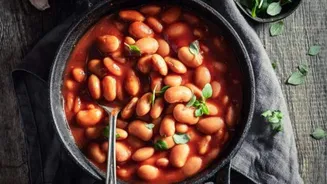Fueling Your Brain
The brain, like any other organ, requires specific nutrients to function optimally. A diet rich in brain-boosting foods can improve cognitive performance,
memory retention, and overall mental clarity. These foods often contain antioxidants, vitamins, and minerals that protect brain cells from damage and support efficient communication between neurons. Adding these foods to your diet is a proactive approach to maintaining a healthy brain throughout your life. It's about feeding your brain the right ingredients to keep it sharp and resilient, allowing you to stay focused, remember information more easily, and protect against cognitive decline. The benefits extend beyond memory; they contribute to overall well-being and a better quality of life. Eating these foods regularly can lead to improved mood and energy levels, offering a holistic approach to brain health.
Berries for Memory
Berries, such as blueberries, strawberries, and raspberries, are packed with antioxidants, particularly flavonoids. These antioxidants combat oxidative stress and inflammation, which can harm brain cells and impair memory. Research suggests that consuming berries regularly can improve memory and protect against age-related cognitive decline. Blueberries, in particular, have been extensively studied for their brain-boosting properties. They help improve blood flow to the brain, which is essential for optimal function. Including a daily serving of berries in your diet, whether fresh, frozen, or added to smoothies, is an easy and delicious way to support your brain health. The variety of berries offers different flavors and nutritional profiles, making it easy to incorporate them into your diet.
Fatty Fish Power
Fatty fish, including salmon, tuna, and mackerel, are rich sources of omega-3 fatty acids, crucial for brain health. Omega-3s contribute to the structure of brain cells, supporting communication between them. Studies have linked omega-3 consumption to improved memory, cognitive function, and a reduced risk of cognitive decline. These fatty acids help reduce inflammation in the brain, further supporting cognitive health. Aim to include fatty fish in your diet at least twice a week. If you don't eat fish, consider a high-quality fish oil supplement to ensure you are getting enough omega-3s. Preparing fish in various ways, such as baking, grilling, or adding it to salads, can make it an enjoyable part of your regular meals.
Nuts and Seeds
Nuts and seeds are excellent sources of vitamin E, an antioxidant that protects brain cells from damage. They are also rich in healthy fats, which are essential for brain function. Almonds, walnuts, and flax seeds are especially beneficial. Walnuts, in particular, are known for their high levels of antioxidants and their ability to improve cognitive performance. Incorporating a handful of nuts and seeds into your daily diet is a simple yet effective strategy for boosting brain health. They are easy to snack on and can be added to salads, yogurt, or oatmeal. Experiment with different types of nuts and seeds to find your favorites and add variety to your diet, while also helping your brain.
The Power of Eggs
Eggs are a great source of choline, a nutrient vital for brain health and memory function. Choline is used by the body to produce acetylcholine, a neurotransmitter critical for memory and communication between brain cells. Adding eggs to your diet supports the overall function of your brain and can help improve memory. You can enjoy eggs in countless ways; they are quick to prepare and can be easily integrated into any meal. Whether you prefer them scrambled, boiled, or poached, eggs are a simple way to give your brain a nutritional boost. Consider them a convenient and effective way to fortify your brain health.
Green, Leafy Goodness
Green, leafy vegetables such as spinach, kale, and broccoli are full of essential nutrients, including vitamin K, lutein, folate, and beta-carotene, which are vital for brain health and cognitive function. These vegetables help to protect brain cells and may slow cognitive decline. Consuming these types of vegetables regularly is linked to improved memory and brain function. Including green, leafy vegetables in your meals supports brain health and overall well-being. Try adding them to salads, smoothies, or stir-fries to make them a part of your daily food intake. They’re a versatile and crucial food group that provides multiple health benefits.
Dark Chocolate Delight
Dark chocolate, particularly with a high cocoa content (70% or higher), contains flavonoids, powerful antioxidants that can improve blood flow to the brain. This can lead to enhanced memory, focus, and cognitive function. Flavonoids in dark chocolate also have anti-inflammatory effects, further supporting brain health. Consuming a small amount of dark chocolate regularly can be a delicious way to boost your brainpower. The key is to choose dark chocolate with a high cocoa content and moderate your intake. The rich taste of dark chocolate makes it a satisfying treat. It can provide a sense of joy while supporting brain function.
Turmeric’s Magic
Turmeric, a spice commonly used in Indian cuisine, contains curcumin, a compound with potent anti-inflammatory and antioxidant properties. Curcumin has been shown to cross the blood-brain barrier and directly benefit brain cells. It can improve memory, reduce symptoms of depression, and potentially protect against Alzheimer's disease. Using turmeric in your cooking or taking it as a supplement can be a valuable addition to a brain-healthy diet. Pairing turmeric with black pepper enhances the absorption of curcumin, making it more effective. It can be easily incorporated into curries, stews, or even smoothies for an added boost to your diet.
Avocados for Focus
Avocados are a source of healthy fats that support blood flow to the brain, which is crucial for optimal cognitive function. They are also rich in antioxidants that protect brain cells from damage. The monounsaturated fats found in avocados contribute to overall brain health and improved focus. Adding avocados to your diet can support brain health. They can be added to salads, smoothies, or spread on toast. Their creamy texture and mild flavor make avocados a versatile addition to various dishes. They offer a good source of energy for the brain and help to maintain mental sharpness.
Whole Grains Benefits
Whole grains, such as brown rice, oats, and whole-wheat bread, provide the brain with a steady supply of glucose, which fuels brain function. They also contain fiber, which helps regulate the release of glucose, preventing sharp spikes and crashes in blood sugar. These grains supply the brain with energy, helping maintain focus and concentration. Choosing whole grains over refined grains is important for overall health and cognitive function. Incorporating whole grains into your daily diet through breakfasts, lunches, and dinners offers a sustained energy source for your brain, contributing to its optimal functioning and overall health.




















